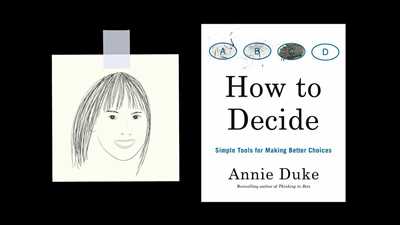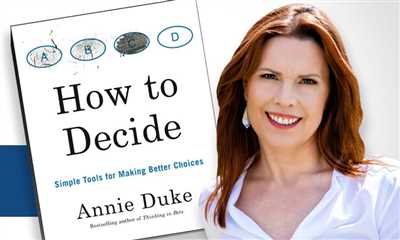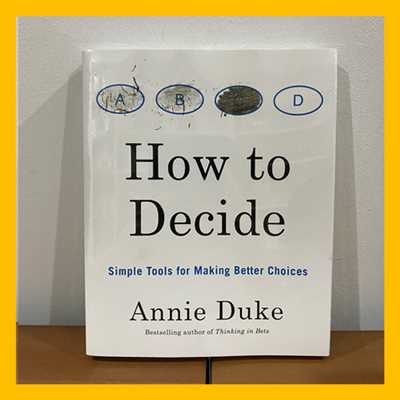
When it comes to making decisions, it’s not always easy. Whether you’re looking to play a game of poker or make an important life choice, every decision you make can have an impact on your future. Annie Duke, a professional poker player, knows a thing or two about decision-making. In her book, “Thinking in Bets,” she shares her insights into how to make better decisions in every aspect of your life.
One of the key tools Duke uses is what she calls “pre-mortem” analysis. Instead of trying to predict the future, she advocates imagining that the decision you’re about to make has already turned out badly. This exercises your thinking beyond just positive outcomes and helps you consider the downsides and potential pitfalls. By thinking through the worst-case scenario, you can prepare yourself for any challenges that may arise.
Another tool Duke suggests is making a decision list. Instead of trying to remember all the options in your head, write them down. This not only helps you organize your thoughts, but it also allows you to see the pros and cons of each option more clearly. Seeing everything listed out in front of you can help you weigh the different factors and make a more informed decision.
For those who are trying to make decisions as part of a team, Duke emphasizes the importance of open and honest communication. Listening to other people’s perspectives and taking their thoughts into account can lead to more well-rounded decision-making. It’s not about telling others what to do, but rather taking the time to understand their point of view and considering how it fits into the bigger picture.
In summary, decision-making is not an easy task. Annie Duke provides valuable insights and tools to help you become a more effective decision-maker. By thinking through the downsides, making decision lists, and being open to listening to others, you can improve the likelihood of making better decisions in any situation.
Detailed Summary How to Decide by Annie Duke
In her book “How to Decide,” Annie Duke provides insightful strategies for making better decisions in various aspects of life. One of the key concepts she introduces is the idea of freerolls, which are situations where you have an opportunity to gain something without risking anything of value. Duke highlights the importance of trying to maximize the number of freerolls in decision-making, as they enable you to explore more options and increase your chances of making a good decision.
To improve decision-making, Duke suggests adopting a 40 percent rule, which entails listening to and considering viewpoints that differ from your own by at least 40 percent. By actively seeking out different perspectives, you broaden your understanding and avoid the trap of biased thinking. This approach also helps in switching between different decision-making modes, such as inside and outside views, which provide different insights into the same problem.
To make better decisions, Duke emphasizes the need for accountability. By taking ownership of the decision-making process, you become more aware of your biases, assumptions, and limitations. Duke suggests keeping a decision journal to record the outcomes and analyze the reasoning behind your choices. This exercise helps you learn from your past decisions and improve your decision-making skills over time.
Duke also introduces the concept of practical decision-making tools, such as pre-mortem analysis and decision trees. A pre-mortem analysis involves imagining that a decision has already turned out to be a failure and identifying the reasons why. This exercise helps uncover potential pitfalls that may have been overlooked initially. Decision trees, on the other hand, provide a visual representation of different possible outcomes and the associated probabilities, enabling you to make more informed choices.
Another valuable lesson from Duke’s book is the importance of separating luck from skill when evaluating the success of a decision. She explains that even the best decisions can sometimes lead to unfavorable outcomes due to luck. By focusing on the quality of the decision-making process rather than the immediate results, you can avoid falling into the trap of short-term thinking and better assess the overall effectiveness of your decision-making.
In summary, “How to Decide” by Annie Duke offers practical guidance for improving decision-making. By being open to different perspectives, seeking accountability, using decision-making tools, and distinguishing between luck and skill, you can make more informed and effective choices in various aspects of your life.
Notes

When making decisions, it is important to take notes. Don’t rely solely on your memory, as it can be faulty and biased. Taking notes allows you to sample your own thoughts and keep track of the information you are considering. It also helps you to engage with the material more deeply and think in a more structured and organized manner.
Having a team of people to bounce ideas off of can also be helpful. They may have different perspectives and offer insights that you hadn’t considered. It is important to listen to others and consider their opinions, even if they differ from your own.
Most of the time, decisions are made based on imperfect information. It is important to recognize that there is a level of uncertainty involved in decision-making. Instead of trying to make the perfect decision, it is often better to make a decision based on the available information and adjust as needed.
Books and ratings can be a useful tool in decision-making, but they should not be the sole basis for decisions. Ratings and reviews can be influenced by bias and personal preferences, so it is important to consider a variety of sources and perspectives.
Annie Duke suggests recently that having more information doesn’t necessarily lead to better decisions. In fact, trying to gather too much information can sometimes lead to analysis paralysis, where you become overwhelmed and unable to make a decision. Instead of focusing on gathering more information, focus on gathering the most relevant information that will help inform your decision.
Another important aspect of decision-making is considering the likelihood of different outcomes. Duke suggests thinking in terms of probabilities rather than absolutes. This involves looking at the potential outcomes and the likelihood of each one occurring. By considering the likelihood of different outcomes, you can make more informed decisions that take into account the potential risks and rewards.
When making decisions, it is important to consider both the positive and negative aspects of each option. Duke suggests making a list of the pros and cons of each option to weigh the potential benefits and drawbacks. This can help you gain a more balanced view and make a decision that aligns with your goals and values.
Accountability is an important aspect of decision-making. After making a decision, it is important to take responsibility for the outcome and learn from any mistakes that were made. This involves conducting a post-mortem analysis to understand what went wrong and how to improve in the future.
Having an open mind and considering different perspectives is key to making good decisions. Duke suggests embracing the outside view, which involves looking at the situation from an outsider’s perspective. This can help you take a more objective and unbiased view of the situation, rather than getting caught up in your own biases and preconceived notions.
In summary, decision-making is a complex process that involves gathering information, considering different perspectives, and weighing the potential risks and rewards. Taking notes, engaging with others, and embracing the outside view can all help to improve the quality of your decision-making. It is important to recognize that decision-making is not always a perfect process and that mistakes will sometimes be made. The key is to learn from these mistakes and continuously improve your decision-making skills.
Practical Tools for Better Decisions: A Q&A with Annie Duke on How to Decide
When it comes to decision-making, Annie Duke is a known expert. Recently, she sat down for a Q&A session to discuss her insights and offer practical tools for making better decisions. One of the key takeaways from her discussion is the importance of having a structured decision-making process.
According to Duke, one of the tools that can help you make better decisions is the use of a decision matrix. This involves listing out the options you have and assigning ratings to each option based on different criteria. By doing this, you can have a more detailed view of the pros and cons of each option, allowing you to make a more informed decision.
Another tool that Duke recommends is to consider the potential downsides of each option. Often, we tend to focus only on the positive aspects of a decision, but it’s important to also consider the potential downsides. This exercise can help us avoid any biases or blind spots in our decision-making process.
Furthermore, Duke argues that seeking feedback from others can be tremendously beneficial. By listening to different perspectives and taking them into account, it becomes easier to spot potential flaws in our own thinking and consider alternative viewpoints. This can help us make more well-rounded decisions and reduce the likelihood of making mistakes.
Accountability is another important aspect of decision-making that Duke emphasizes. By holding ourselves accountable for the outcomes of our decisions, we become more motivated to ensure that we’re making the best choices possible. This includes taking the time to evaluate the results of our decisions and learning from them for future reference.
When it comes to decision-making in a team setting, Duke suggests using a decision diary. This involves documenting the decision-making process, including the reasoning and rationale behind each choice. This can help teams stay on track and avoid any conflicts or misunderstandings that may arise.
In summary, there are several practical tools that can help us make better decisions. Whether it’s using decision matrices, considering downsides, seeking feedback, or practicing accountability, these tools can enhance the decision-making process and lead to more successful outcomes. So, next time you find yourself trying to decide on something, take Duke’s advice and utilize these tools for a more effective decision-making experience.
Listen to a sample from How to Decide
Deciding on something can be a hard task. Annie Duke, a former professional poker player, makes it easier with her book “How to Decide”. In this book, Duke shares her insights and strategies on decision-making, providing readers with a detailed analysis of the tools and techniques she uses to make better decisions.
One of the tools Duke discusses is the “pre-mortem” technique. Rather than focusing on the positive outcomes, Duke suggests looking at all the possible negative outcomes that could occur after making a decision. By doing so, we can identify potential pitfalls and make better-informed choices.
Duke also emphasizes the importance of listening to others and learning from their experiences. She argues that we should seek out different perspectives and take into account other people’s opinions and advice. By considering a range of viewpoints, we can gain a more well-rounded understanding of the decision at hand.
Another valuable concept Duke introduces is the idea of “decision quality”. Instead of focusing solely on the outcome of a decision, Duke suggests we should evaluate the decision based on the information available at the time. Sometimes, even when we make a good decision, the outcome may not be what we expected. Duke encourages us to remember that decision-making involves a certain level of uncertainty and that we should avoid hindsight bias.
Listening to a sample from “How to Decide” can give you a taste of Annie Duke’s approach to decision-making. By hearing her explain the concepts and techniques in her own words, you’ll get a better sense of how to apply them to your own decision-making process.
For example, Duke explores the concept of “probability thinking” in the sample. She discusses the importance of understanding the likelihood of different outcomes and the role it plays in decision-making. By looking at the probabilities and considering the potential outcomes, we can make more rational and reasonable choices.
In the sample, Duke also shares a QA session with Dave, where they discuss various topics related to decision-making. It’s a great opportunity to hear Duke’s insights and learn from her experiences. This interactive format allows you to engage with the material and gain a deeper understanding of the concepts presented in the book.
Overall, “How to Decide” provides readers with practical tools and strategies for making better decisions. By listening to a sample from the book, you can get a glimpse into Duke’s approach and see if it resonates with you. Whether you’re deciding between two options or trying to analyze a complex situation, Annie Duke’s insights can help you navigate the decision-making process more effectively.
Ratings and Reviews

When it comes to deciding on a course of action, Annie Duke believes that it is important to look at ratings and reviews from others. She suggests that sometimes we can learn from the mistakes of others and avoid making the same ones ourselves. For example, if someone like Dave shares their experience and provides detailed notes on the downsides of a particular decision, it becomes easier for us to weigh our options and decide whether it is a good choice for us.
Another practical way to make decisions is by looking at the likelihood of different outcomes. Duke recently suggested that in the national finals of a poker tournament, deciding to play a risky move like going all-in with a mediocre hand might not be a good idea. She points out that although the potential gain might be high, the likelihood of losing is also significant. In such situations, it is often more reasonable to take a more conservative approach and make decisions based on the highest probability of success.
It’s important to note that sometimes relying on the opinions and experiences of others can also have downsides. Duke cautions that we should be careful not to let the ratings and reviews of others interfere with our own judgment. While it can be useful to listen to the advice and perspectives of others, ultimately we each have our own unique set of circumstances and goals that need to be taken into account. It’s important to find a balance between learning from others and making decisions that align with our own values and objectives.
When trying to decide, it is helpful to evaluate the practicality of the options at hand. Duke suggests that by listing out the pros and cons of different choices, we can gain a clearer understanding of the potential outcomes and the impact they may have. By doing this, we can better assess the practicality of each option and make a decision based on what is most likely to lead to a desirable result.
In summary, Annie Duke believes that utilizing ratings and reviews from others can provide valuable insights and perspectives when making decisions. However, it is important to approach these opinions with a critical eye and make sure they align with our own goals and values. Evaluating the likelihood of different outcomes and considering the practicality of each option can help guide us in the decision-making process. Ultimately, we are each the maker of our own choices, and it is up to us to determine the best course of action.

